We may receive a commission when you use our affiliate links. However, this does not impact our recommendations.
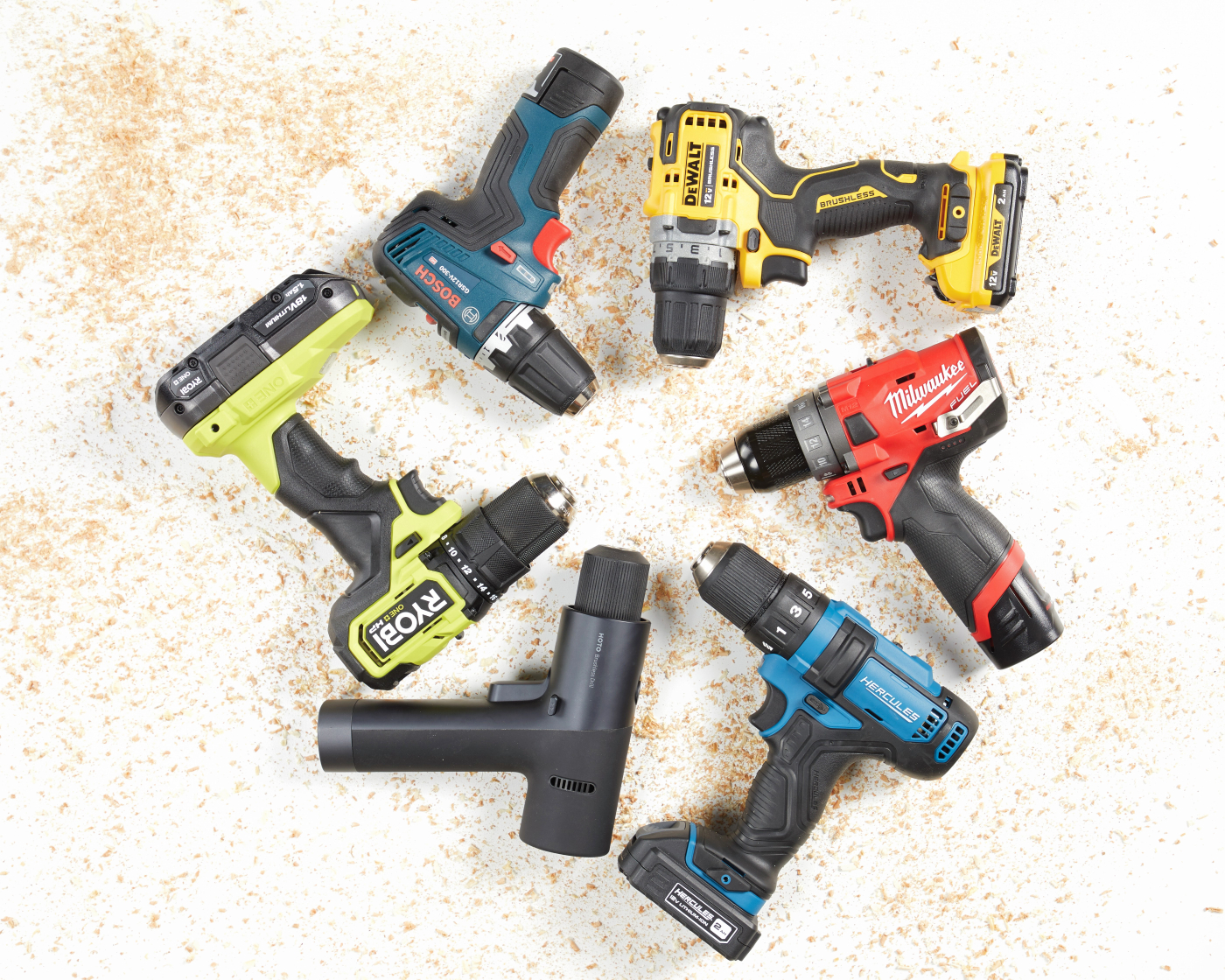 We take a look at six drills to see what sort of progress these tools have made in the past decade.
We take a look at six drills to see what sort of progress these tools have made in the past decade.
There was a point in time when drill comparisons were ubiquitous in the pages of this magazine. There was an almost comforting familiarity in seeing the latest and greatest put to the test every 18 months or so. And then, for whatever reason, we stopped doing them in 2009. Maybe it was the lack of perceived technological advancement, or maybe interest just dried up, but it’s been 13 long years.
Clearly, it was time to get the band back together and see what was new. We decided to look at 12v drills, which are still the underdogs of the power tool world. Twelve volts is all most people need, and the smaller, lighter package means they’re easier to work with as well.
We reached out to all of the usual players (and some new ones) and ended up with five 12v drills and one compact 18v. Supply chain issues meant a few would-be competitors had to miss out, and we decided to throw in a wildcard with a bigger drill. We weren’t looking to see if the 12v drills would match the more powerful tool but instead to see if a compact 18-volt drill could match the ease and comfort of the smaller drills. Our goal was to try and find out if there was a new Goldilocks zone in the drill market.
Testing the Drills:
The Lag Bolt Test
We decided not to reinvent the wheel with the testing regiment. To test battery life, we would see how many 1/4” by 1-1/2“-long lag bolts each drill would drive into poplar on the lowest speed, and highest clutch setting. Then to stress test the motor and battery, we would see how many 1“ holes could be drilled into 1-3/4“ poplar at the highest speed.
The results were impressive, to say the least. Every drill (except one, more on that in a moment) drove more lag screws than any of the 12v drills we tested in 2009. They even beat the average number of screws driven in an 18v comparison from 2008. We had a bag of 60 lag screws for each drill. All of the testers drove those 60 screws, unscrewed them, then drove them an additional time for 120+ lags driven for each drill. The combination of half-full battery meters and sore arms made us cut off testing at that point. Even the sole brushed tool in our test, the Hercules, just kept going and going.
The Bosch came up with a big ole zero in this test. The highest clutch setting didn’t have enough torque to drive a single lag screw. Since no other drill suffered this issue, we let the results stand as is.
Drill-A-Thon
The second part of the test, drilling 1“ holes with a spade bit, ran into a bit of a snag from the start. The self-feeding spade bits we picked up were pulling too quickly for the high-speed setting on every drill, causing them to stall. Instead, we ran them at low speed with the clutch set to drill mode.
Here again, the current crop of drills completely outperformed their fore-bearers. Half of the drills we tested drained their battery entirely, and the other half were stopped by heat cutoff sensors in the drill. Those three, the Hercules, Hoto, and Milwaukee, were perfectly fine after cooling down for a short time. The results reflect how many holes they drilled prior to the safety measures being engaged. It might be easy to criticize those drills for their lower numbers, but there’s nothing wrong with technology to prevent damage and extend the life of the tool.
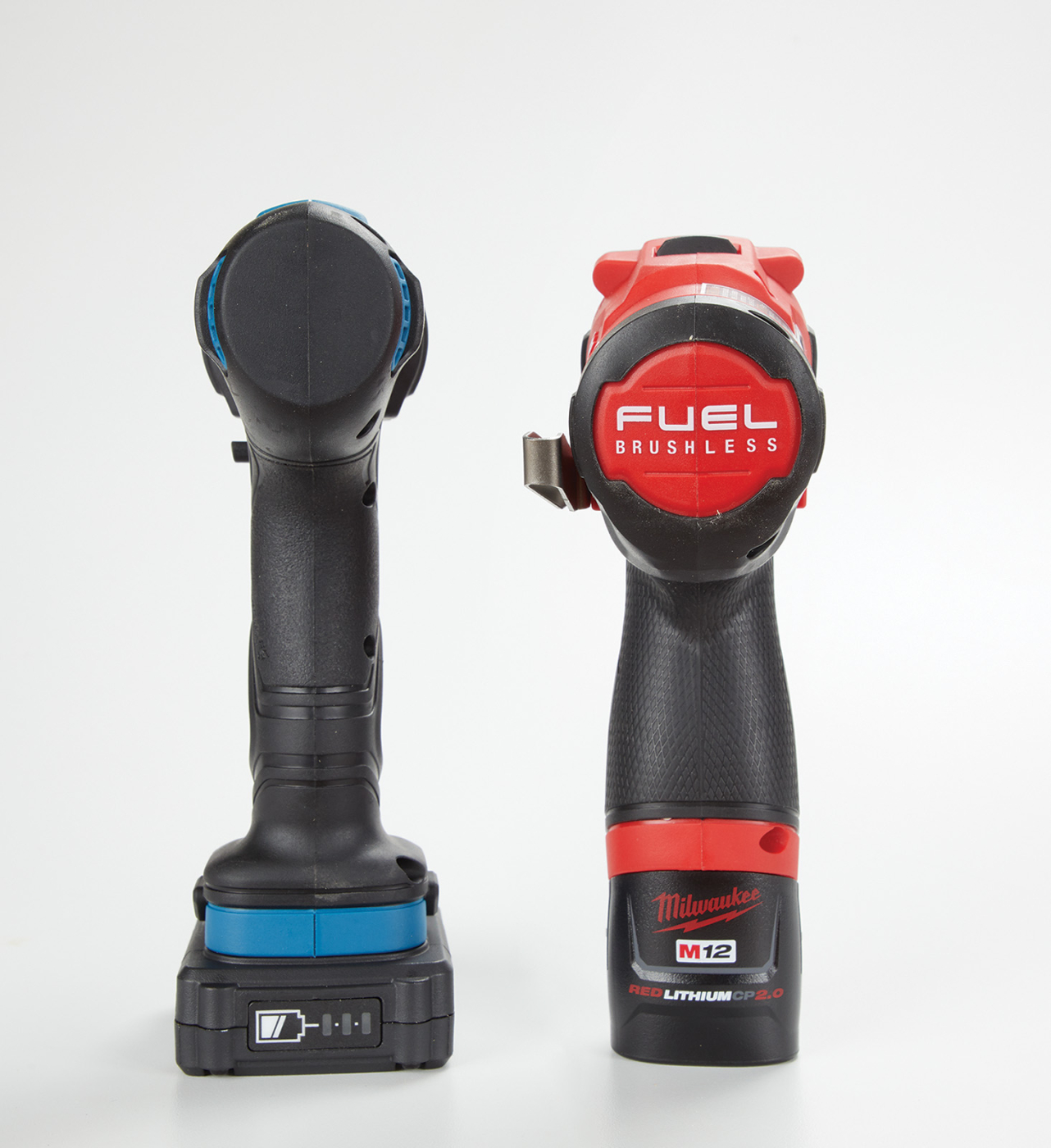
The grip size varied wildly from tool to tool. The Hercules (left) is almost too narrow at times while the fatter Milwaukee (right) is better for someone with larger hands.
Ergonomics
We also looked at the ergonomics of each drill. When you drive 120 bolts back-to-back, you quickly recognize the importance of comfort. The ranking is purely subjective, as everyone’s hands are different, but there was a lot of back-and-forth and nitpicking little things like the location of the directional switch.
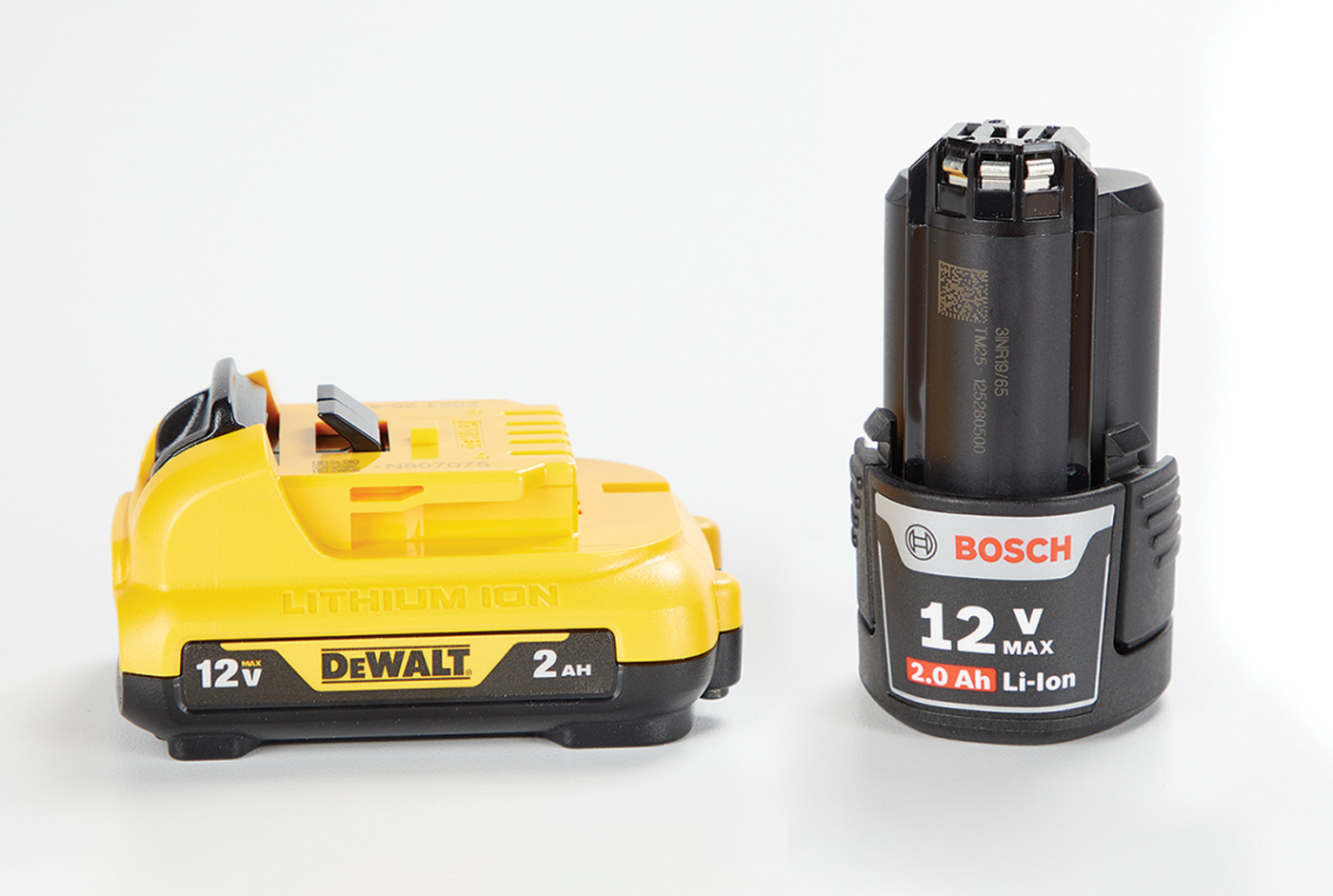
The drills were evenly split between flat and tube style packs.
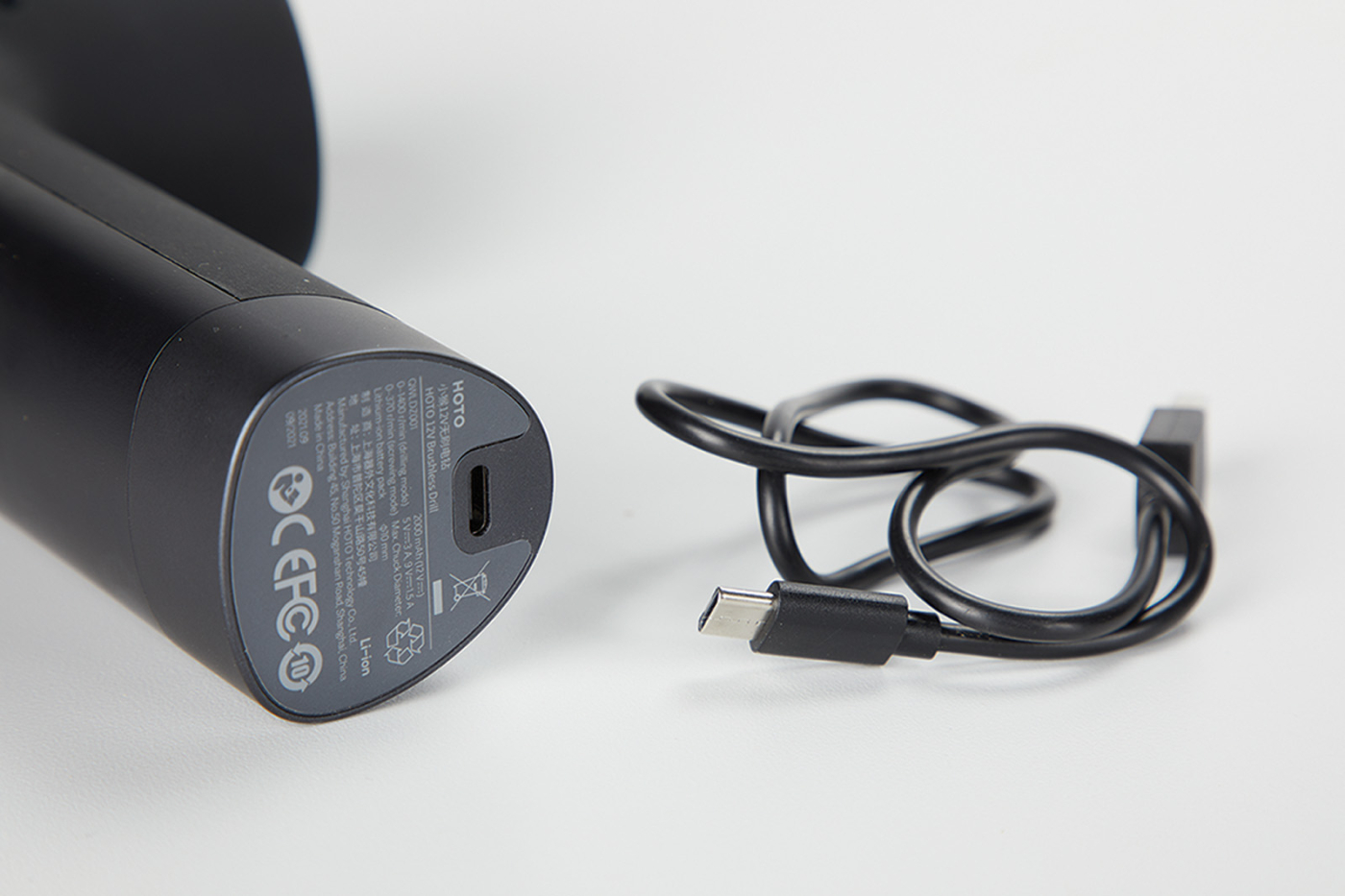
The Hoto charges via a USB cord, which took a long time to charge.
Assorted Observations
Here are a few things we noticed that caught our attention.
• We almost gave full credit to the improved performance on brushless motors until we realized the Hercules didn’t have one. The fact that it performed near the same level speaks to how well it’s made.
• The three most comfortable tools all used a more traditional battery location at the bottom of the tool instead of in the handle. The Bosch was the most comfortable of the tube-style packs.
• The electric “clutch” on the Hoto worked very well, even if it wasn’t as easy to use as a standard one. It also has a pulse mode to help newbies avoid stripping out screws, but it didn’t seem to do much at all.
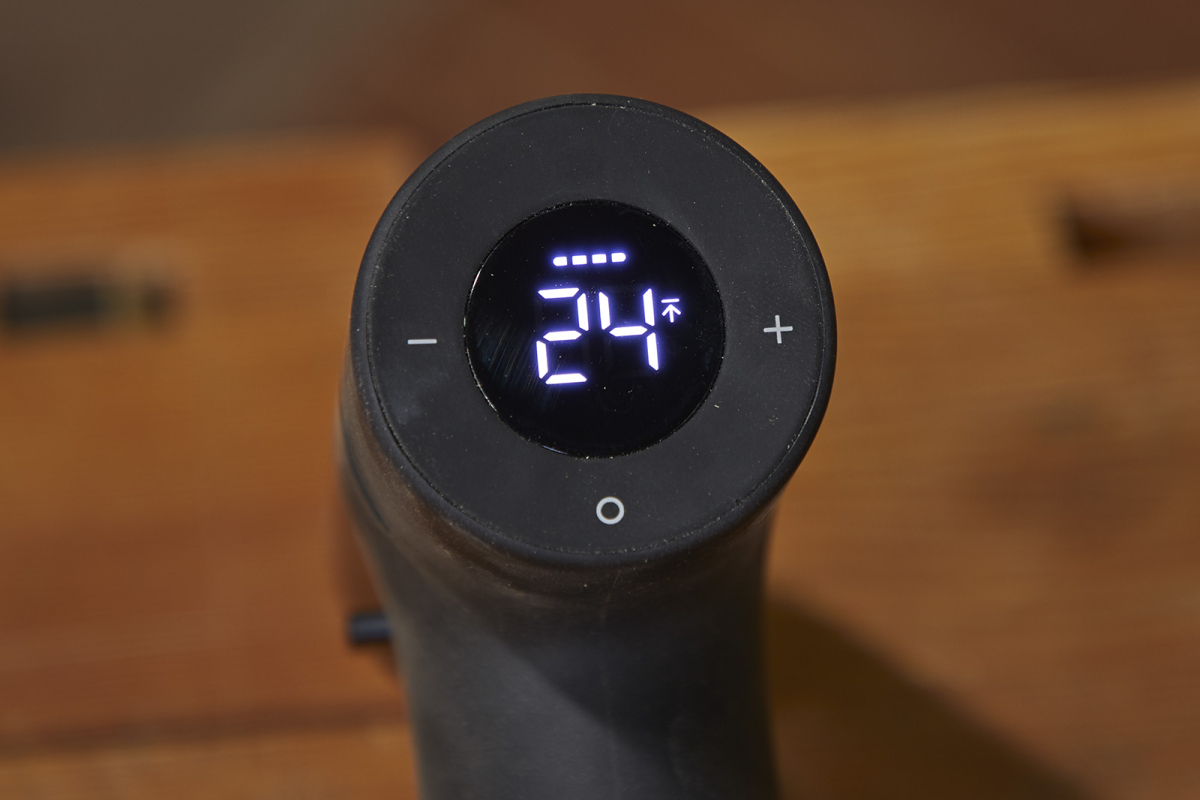
The clutch on the Hoto (they call it a torque selector) is a very different concept than we’ve seen before, but it worked quite well.
• The chargers for the DeWalt and Hercules works for their 12v and 20v platforms, which is a big convenience.
• The Ryobi suffered from an issue we’ve seen on a few other Ryobi drills—it comes to a stop so fast the chuck occasionally loosens from the inertia.
• Every drill besides the Hoto had a spot for a belt hook, though the Hercules did not include one. In addition to the belt hook, the Bosch also had a bit holder attachment that can be mounted in the same location.
• DeWalt uses plastic disguised as metal for the chuck and collar. It’s not particularly convincing.
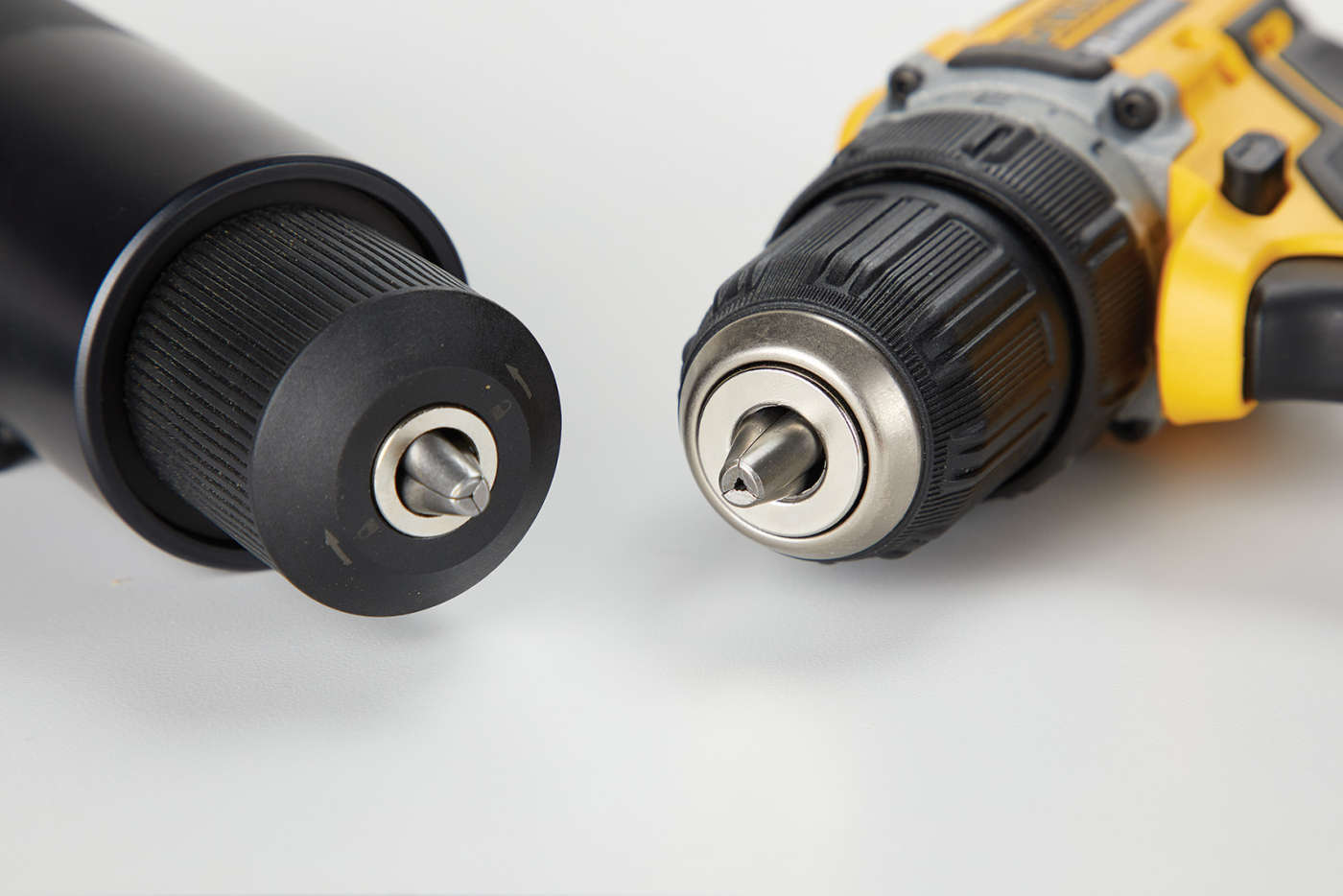
Chucks that close completely tight (left) can hold the extra-small bits that are nice for drilling pilot holes. Some can only grip bits down to 1/16” (right).
A Look At Each Drill
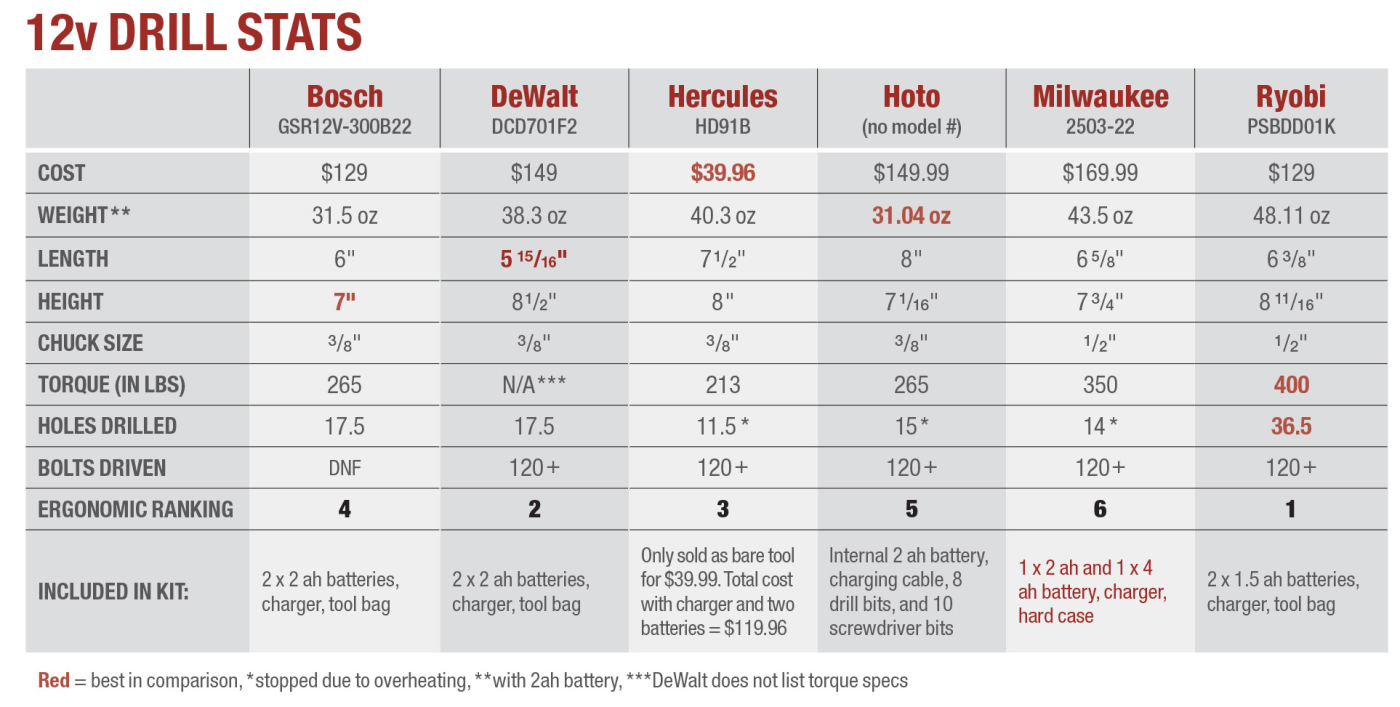
Ryobi: The Ringer
Tool: 18V Brushless Cordless Compact 1/2 in. Drill/Driver PSBDD01K Shop Now
Manufacturer: Ryobi
MSRP: $129 (Includes charger, case, and two 1.5ah batteries)
Bringing an 18-volt drill to a 12-volt competition is a bit like bringing a abut is it any better? In short, yes.
It shouldn’t be a surprise that the 18v Ryobi drill outperformed the other drills here, as that’s exactly what we expected it to do. We were curious if the size tradeoffs were worth the performance increase. Turns out the Ryobi isn’t actually that much bigger, though. It’s the tallest by 3/16“, heaviest by 4.5oz, and actually midpack in length. It was even tied for second-cheapest! It was also the most comfortable to hold, which is partially attributed to the battery pack nicely balancing the weight of the drill. The battery pack is also where the on-paper measurements fall a bit short. It’s quite wide and long, making it a tight fit in places the other drills will happily go. It might be the “best” drill in the test, but it’s not the best 12v drill here.
Dewalt: Editor’s Choice
Tool: 12v MAX Brushless Drill/Driver DCD701F2 Shop Now
Manufacturer: DeWalt
MSRP: $149 (Includes charger, case, and two 2ah batteries)
From the get-go, the DeWalt sort of flew below the radar. Yes, it was comfortable, lightweight, and performed well, but didn’t seem to stick out in any particular way. It did perform well during the hole drilling portion, finishing with the same number of holes as the Bosch, but it also felt stronger throughout. It also was just barely edged out of the top spot in ergonomics.
It wasn’t until we started discussing our favorites after the testing that the DeWalt kept coming up. After all, it was comfortable, lightweight, and performed well, what more did we want? It did everything with little drama and no real negative attributes. Exactly what you want in a drill.
Hercules: Bargain Champ
Tool: 12v Cordless 3/8 Drill/Driver Shop Now
Manufacturer: Hercules
MSRP: $39.99 (bare tool) + $34.99 (charger) + $24.99 (battery)
The Hercules was the only brushed (as opposed to brushless) tool in the test and the only one that didn’t come in kit form. Neither of those facts significantly held it back, though. Even after purchasing a charger and two batteries, the Hercules was the least expensive drill in the test. If you shop in-store at Harbor Freight, you can even save an additional $25 to drop the cost below $100. During our testing, the Hercules kept up during the driving portion and only scored a lower number in the hole portion due to a temperature cutoff. After letting the drill rest a minute, it was ready to go again.
The ergonomics were neck-and-neck with the DeWalt, and the moving parts and plastic exterior were well made. That being said, this was the only tool to off-gas, with a noticeable smell during use
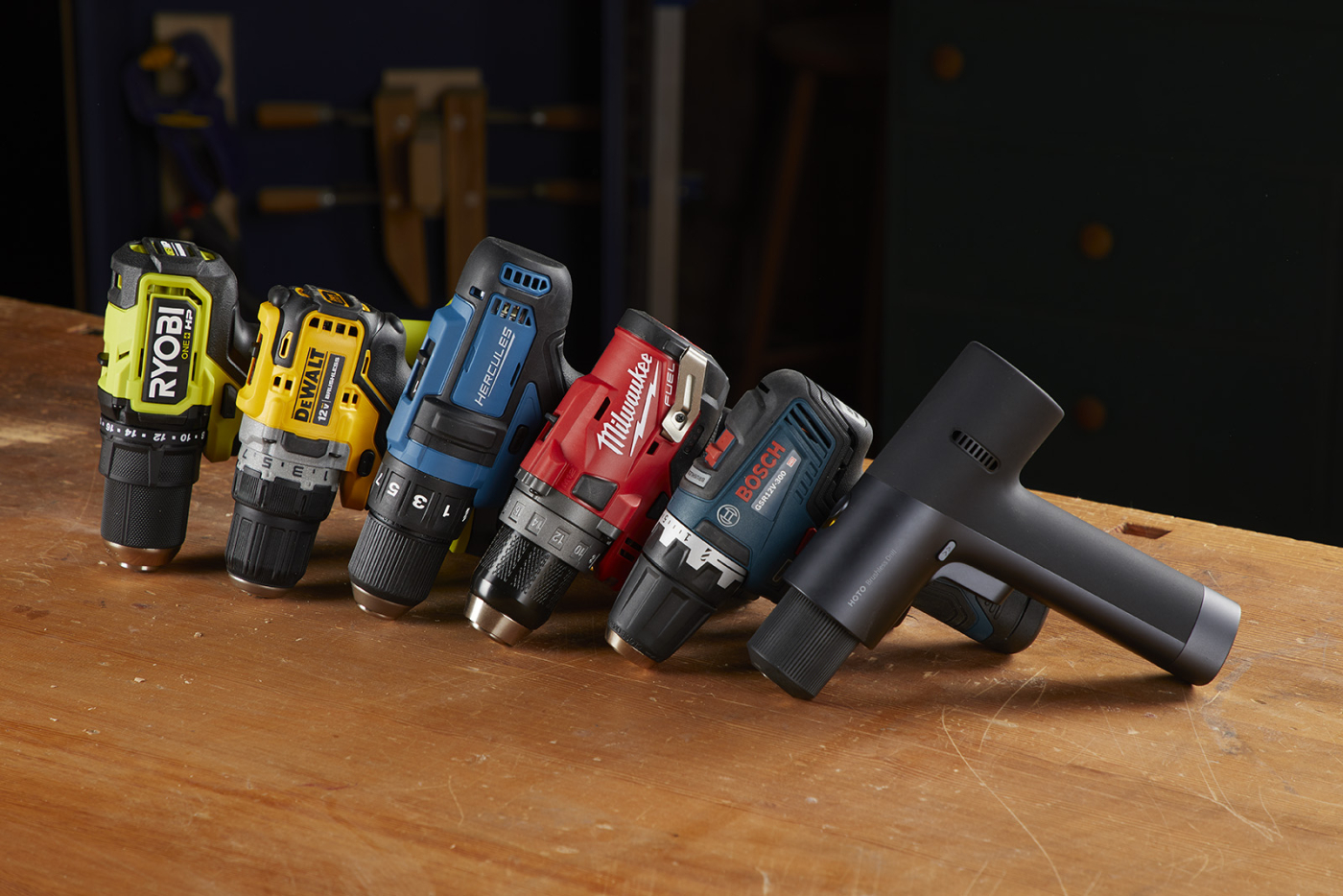
This isn’t a ranking, they just looked best in this order.
Milwaukee: Best Built
Tool: M12 Fuel Brushless Drill/Driver 2503-22 Shop Now
Manufacturer: Milwaukee
MSRP: $169.99 (Includes charger, hard case, 2ah battery, and 4ah battery)
Right out of the box, the Milwaukee felt in a different league than everyone else. It was substantial—the only tool here with a metal chuck and cast collar. It felt like you could drop it off a roof, and the drill wouldn’t even notice.
There was also a heft to it, a heft that portrayed quality while also just making it too dang heavy. The weight plus a handle that’s very wide at the bottom bumped it to the bottom of the ergonomic rankings. It was not so much that it was uncomfortable as it was fatiguing.
The different “league” also applied to the equipment the Milwaukee came with. It was the only drill in the test to include a 4ah battery and a hard carrying case. While the Hoto felt like it was designed for a casual user, the Milwaukee felt like it was built for business.
Bosch: The Balance Master
Tool: 12v Brushless Drill/Driver GSR12V-300B22 Shop Now
Manufacturer: Bosch
MSRP: $129 (Includes charger, case, and two 2ah batteries)
The Bosch wasn’t the outright winner in any particular area and was the only drill to struggle with the lag screws, but we kept coming back around to how much we enjoyed it. The big reason was balance. It was effectively the smallest and lightest drill here, and as a result, we experienced no fatigue in our testing. It almost felt like a smaller class of a drill; a Yaris in a world of Corollas.
The biggest thing holding the Bosch back was a seeming lack of torque. On paper, it was solidly competitive, but in practice, something was missing. On the highest clutch setting, there wasn’t enough torque to drive a single lag all the way into the wood. If the clutch was disengaged it had no issue, but that’s not a recommended practice for installing fasteners. With that in mind, if one chose to do so, we have very little doubt the Bosch would have put up similar numbers.
HOTO: The Underdog
Tool: 12v Brushless Drill Shop Now
Manufacturer: Hoto
MSRP: $149.99 (Includes internal 2 ah battery, charging cable, 8 drill bits, and 10 screwdriver bits)
It might be a bit unreasonable to call the second most expensive tool in the test an underdog, but that’s definitely how we all felt about it. Hoto is a virtually unknown company out of China making a drill that looks like a blow drier, charges via USB, and uses a digital clutch.
We cynically figured it would be entertaining to watch it struggle through for a bit before finally melting down. Instead, it was an absolute tank, tackling each task with the same gusto as the big brands and even beating them in some.
It wasn’t all sunshine, though. The futuristic look was ergonomically challenged, and though the internal battery was long-lasting, it takes forever to charge via USB. The hours-long charge time bumps this from a would-be shop drill to something that’s better suited for the occasional DIYer or homeowner.
Final Thoughts
So what did we learn after all of our testing? First off, there’s not a bad tool in the entire test. Even the unique-styled Hoto, which got a few chuckles when it was unboxed, outperformed our expectations and then some. Every drill here would work well for nearly any task a woodworker would throw at it.
Our thoughts on compact 18v tools as a replacement for 12v were mixed. The Ryobi was the most powerful tool here and the most comfortable… but also the heaviest with the bulkiest battery. If you’re committed to an 18v platform, then go for it. I still personally grab for my 12v first for most household tasks. Of the drills tested, the DeWalt seemed to stand out the most as far as ergonomics, balanced with power and battery life. It’s a well-built tool, but then again, the rest are as well.
Finally, we learned that the tools of today are better than the ones of yesteryear in every way. They’re more powerful, reliable, weigh less, and when factoring in inflation: cheaper. So while it might have been 13 years since we last ran a test like this, don’t expect us to wait for another 13 to do it again. Though we are going to give our arms a bit of a rest first.
Here are some supplies and tools we find essential in our everyday work around the shop. We may receive a commission from sales referred by our links; however, we have carefully selected these products for their usefulness and quality.








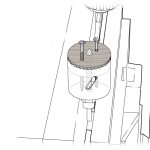

I recently purchased the Bosch brushless Chameleon set with multiple heads, impact, offset impact, adjustable drill, and angle head. I used it recently to tighten a handlebar nut on a new bike and the torque was so strong it twisted my wrist at the tightest set. Torque was akin to a air wrench. The battery for my arthritic hands wasn’t a problem at all, so far. This tool fits very comfortably in my hand and isn’t at all heavy but feels heavy duty.
Glad you’re enjoying your Bosche, it really is a great option. It sounds like you might have had the clutch disengaged/drilling setting, which none of the other drills required in order to drive lag screws. Like I said in the article, I have no doubt that it has enough torque, it was just let down by the clutch design on our particular model.
I agree with your comments about the drills I have tried. However, there are a couple of criteria that were not considered that are important, especially to older woodworkers.
1. Ease of removing batteries for charging. Both the Bosch and the Milwaukee are tough on arthritic or even just weak hands. I wanted the Milwaukee but settled on the Bosch because I could build a fixture to help be squeeze the sides to get the battery out. I couldn’t build one as simply with the Milwaukee.
2. Eccentricity of the chuck. The DeWalts I tried at both Home Depot and Lowes showed quite a bit of movement at the end of the drill bits. I tried at least four different drills and they all had this problem. I read online that others saw this issue too. Some may not care since it is hand-held and not a drill press but it is a sign of a quality problem that was not present in the Bosch or Milwaukee drills. (I am in general a supporter of DeWalt–I love my 735 planer.